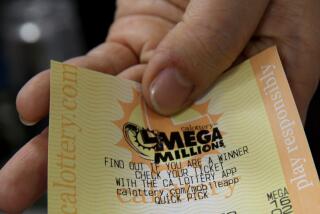State Sells Nearly All of Power Bonds
- Share via
California completed the bulk of its record offering of power bonds Tuesday, selling a total of $6.5 billion of fixed-rate securities amid strong demand from individual and institutional investors.
With tax-free yields on the bonds offering returns well above what many other investment-grade securities are paying, investors such as Arnold Laven of Encino found the bonds a good deal.
“I was getting about 1% in a money market fund, so I liked the yield,” said Laven, 80, who got a combined 3.5% rate on a mix of insured and uninsured bonds at six-year maturities. “At my age, I didn’t want to go out too far.”
On Friday and Monday the state took orders totaling $1.5 billion from small investors. On Tuesday institutional investors were invited to bid.
State Treasurer Phil Angelides called overall demand for the bonds “very strong.” He said about 90 institutions, including mutual funds, put in offers.
The securities, delayed by political wrangling for more than a year, were sold as part of an $11.3-billion bond deal in total, proceeds of which will repay loans California took on to buy power during the energy crisis of 2000 and 2001.
The bonds aren’t direct obligations of the state; they will be paid off during the next 20 years by surcharges on the electricity bills of the state’s major utilities.
Partly because of the sheer amount of bonds sold and partly because of the political and legal risks the securities carry, institutional investors demanded slightly higher returns than what are available on other investment-grade tax-free bonds.
The state agency selling the bonds, the Department of Water Resources, on Tuesday raised the top yield to 5.48% on an uninsured 20-year bond, up from the 5.45% quoted to small investors Friday. The bonds were sold in maturities ranging from 2 1/2 years to 20 years.
Individual buyers will get the higher yields if the bonds they ordered Friday also were available to institutional investors, according to Angelides and bankers at J.P. Morgan Chase & Co., the deal’s lead underwriter.
The higher yields will cost the state slightly more per year in interest costs, Angelides said. But he said the deal cost the state as much as 1 full percentage point less in interest than what analysts had estimated last year, when market interest rates in general were much higher.
The bond sale had been delayed by various hurdles, including most recently a lawsuit filed in October by utility Pacific Gas & Electric Co. that questions a plan to use utility revenues to back the bonds.
“The real test will be where the bonds are trading in a few months,” said Steve Galiani, director of municipal bonds for Wells Capital Management in San Francisco. “We could see some news on power contracts or lawsuits that could affect the trading.”
Because the yields are exempt from federal and state income tax for California residents, the true returns can be sharply above the stated yields.
A 5% tax-free muni yield provides a taxable equivalent return of about 9% for someone in the top tax bracket.
“I told my wife, ‘Look at these yields,’ ” said Zane Mann, publisher of the California Municipal Bond Advisor newsletter in Palm Springs. “And she said, ‘Yes, look at our SoCal Edison bill -- we’re going to be paying off those yields.’ ”
More to Read
Inside the business of entertainment
The Wide Shot brings you news, analysis and insights on everything from streaming wars to production — and what it all means for the future.
You may occasionally receive promotional content from the Los Angeles Times.










